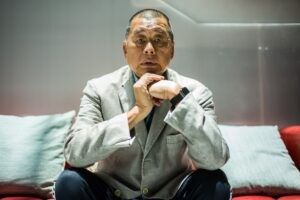Foreign minister David Cameron called upon Hong Kong authorities on Sunday (17) to cease the “politically-motivated” prosecution of pro-democracy media tycoon Jimmy Lai, who faced trial on Monday (18) on charges of national security crimes.
British citizen Lai, 76, is charged with several counts of “colluding with foreign forces”, a crime under a national security law imposed on Hong Kong by Beijing in 2020 following massive pro-democracy protests.
Cameron said in a press release that he was “particularly concerned at the politically-motivated prosecution” of Lai.
“As a prominent and outspoken journalist and publisher, Jimmy Lai has been targeted in a clear attempt to stop the peaceful exercise of his rights to freedom of expression and association.
“I call on the Hong Kong authorities to end their prosecution and release Jimmy Lai,” he said.
Cameron oversaw a deepening of relations with Beijing when he served as prime minster between 2010 and 2016, and hosted China’s leader Xi Jinping for a state visit in 2015, but relations soured dramatically after his departure.
And his comments are not likely to go down well in Beijing, which last week accused Britain of having “malicious intentions” toward Hong Kong after Cameron met with Lai’s son Sebastian in London on Tuesday.
Foreign ministry spokeswoman Mao Ning urged the UK to “earnestly respect the facts and the rule of law, and stop meddling in Hong Kong issues and China’s internal affairs”.
Britain is the former colonial power in Hong Kong, handing over control to China in 1997.

Cameron said the national security law under which Lai is being prosecuted was a “demonstration of China breaking its international commitments.
“It has damaged Hong Kong, with rights and freedoms significantly eroded. Arrests under the law have silenced opposition voices,” he said.
“I urge the Chinese authorities to repeal the National Security Law and end the prosecution of all individuals charged under it.”
If convicted, Lai faces up to life in prison.
The law aimed to quash dissent, and prominent opposition lawmakers and democracy activists in the semi-autonomous city have either fled abroad or been jailed in the three years since its passage.
(AFP)
